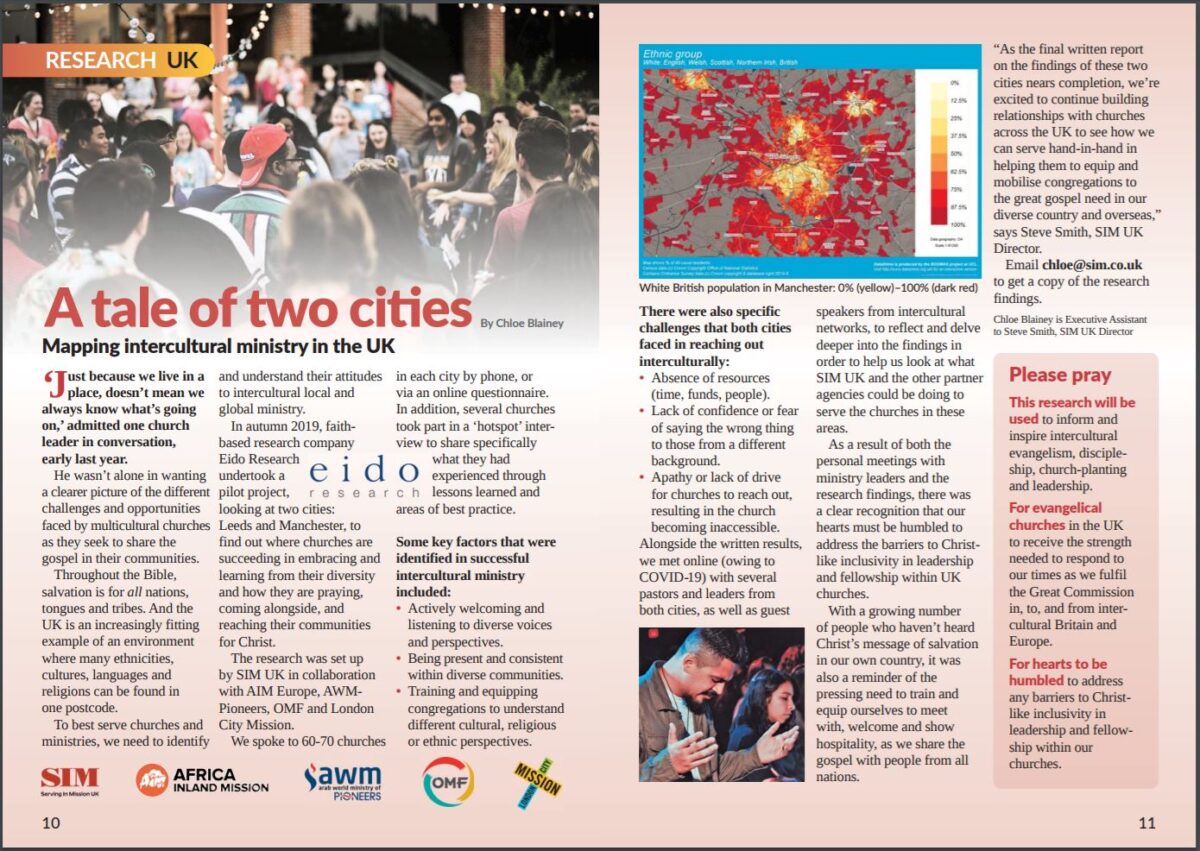Mapping intercultural ministry in the UK
‘Just because we live in a place, doesn’t mean we always know what’s going on,’ admitted one church leader in conversation, early last year. He wasn’t alone in wanting a clearer picture of the different challenges and opportunities faced by multicultural churches as they seek to share the gospel in their communities.
Throughout the Bible, salvation is for all nations, tongues and tribes. And the UK is an increasingly fitting example of an environment where many ethnicities, cultures, languages and religions can be found in one postcode. To best serve churches and ministries, we need to identify and understand their attitudes to intercultural local and global ministry.

In autumn 2019, faith-based research company Eido Research undertook a pilot project, looking at two cities: Leeds and Manchester, to find out where churches are succeeding in embracing and learning from their diversity and how they are praying, coming alongside, and reaching their communities for Christ.
The research was set up by SIM UK in collaboration with AIM Europe, AWM-Pioneers, OMF and London City Mission. We spoke to 60-70 churches in each city by phone, or via an online questionnaire. In addition, several churches took part in a ‘hotspot’ interview to share specifically what they had experienced through lessons learned and areas of best practice.
Some key factors that were identified in successful intercultural ministry included:
– Actively welcoming and listening to diverse voices and perspectives
– Being present and consistent within diverse communities
– Training and equipping congregations to understand different cultural, religious or ethnic perspectives
There were also specific challenges that both cities faced in reaching out interculturally:
– Absence of resources (time, funds, people)
– Lack of confidence or fear of saying the wrong thing to those from a different background
– Apathy or lack of drive for churches to reach out, resulting in the church becoming inaccessible.
Alongside the written results, we met online (owing to COVID-19) with several pastors and leaders from both cities, as well as guest speakers from intercultural networks, to reflect and delve deeper into the findings in order to help us look at what SIM UK and the other partner agencies could be doing to serve the churches in these areas.
As a result of both the personal meetings with ministry leaders and the research findings, there was a clear recognition that our hearts must be humbled to address the barriers to Christ-like inclusivity in leadership and fellowship within UK churches.
With a growing number of people who haven’t heard Christ’s message of salvation in our own country, it was also a reminder of the pressing need to train and equip ourselves to meet with, welcome and show hospitality, as we share the gospel with people from all nations.
“As the final written report on the findings of these two cities nears completion, we’re excited to continue building relationships with churches across the UK to see how we can serve hand-in-hand in helping them to equip and mobilise congregations to the great gospel need in our diverse country and overseas,” says Steve Smith, SIM UK Director.
By Chloe Blainey
Please pray:
- This research will be used to inform and inspire intercultural evangelism, discipleship, church-planting and leadership.
- For evangelical churches in the UK to receive the strength needed to respond to our times as we fulfil the Great Commission in, to and from intercultural Britain and Europe.
- For hearts to be humbled to address any barriers to Christ-like inclusivity in leadership and fellowship within our churches.
This story first appeared in our quarterly magazine, Serving Him, below:





